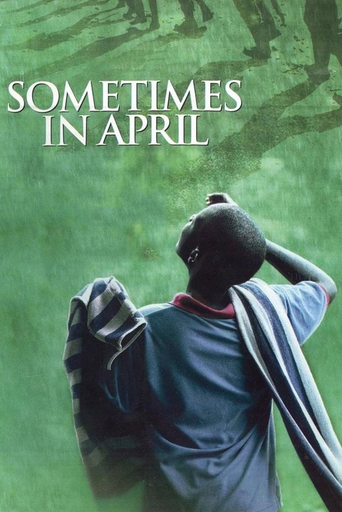

Sometimes in April is not boring, however it's way far from being introspective and realistic.Pedantry oozes from every inch of the celluloid. The director hasn't given enough effort to explain the "why". It's only about the "what" and a reduced, possibly one-sided version of the "what" it is.The film is heavily oriented towards western audiences (it pushes the right "western" buttons). Some things that resonate with the western mentality simply do not register with Rwandan audiences. Some other things that touch on local psyche and actually explain the flow of events in Rwanda are not even explored here.So can the viewer learn anything about the conflict from this movie? I'm not sure at all. The only safe outcome is that war is bad, but you knew that already.
... View MoreWhen I first watched 'Sometimes in April', I can honestly say it affected me more than any other film ever has. It traumatised me, I started to question human beings. I always, rather naively thought that all humans were intrinsically good and just did bad things from time to time, or even had an upbringing that made them the way they were. But this film taught me things aren't always so black and white. The Rwandan Genocide happened for no reason. Hundreds of thousands of people were ruthlessly murdered, for nothing. The film itself seemed to portray the idea that all this killing simply happened to satisfy a blood lust, nothing else. I can say that I have no idea why anyone would want to harm their fellow man in such an atrocious way.Now to the film itself. The soundtrack to the film was extremely well fitted. I could in no way fault the acting, and the direction was well done. The only fault I could possibly give it, and this is at a stretch, was it got confusing at times as the film would jump from future to present without telling you it had. That was obviously hard to follow.Certain scenes in the film were very difficult to watch. And when I went to see how much the film was to buy on the internet, it came up as a PG (in UK). This disturbed me as I'm 18 and was strongly affected by this film. I would never let anyone under the age of, at the very least, 15 watch it. This is not because its gory (although thats an obvious factor), or because of the obvious strong issues, but because it is true. Its one thing watching 'Saw' for entertainment value (I don't see the appeal myself), but its another to watch a true account of what actually happened. They left nothing out. As a watcher you feel like you were actually there witnessing these atrocities.Although devastating to watch, and not for the faint of heart, I am still glad I saw this film, even if it was just to educate myself. I felt I had to know and no other film has better betrayed the Rwandan Genocide than this one.
... View MoreHow could this have happened? How could the most powerful countries including ours turn away? The worse part about these events and the ones before is that such atrocities are still happening! The film takes place in 1994 in Rwanda: a military man struggles with his own conscience and his own soul as he tries to bring himself to forgive his brother a DJ who encouraged and participated through the radio programs the genocide that would precede. For 100 days, men, women, and even children were slaughtered-over what? The question still looms. I have seen Hotel Rwanda and it was very affecting and hard to watch. But this film takes you outside the hotel and into the streets, the jungles, the roads, and all throughout Rwanda. We watch as the UN do nothing. We watch as the American government question what is the exact criteria that needs to be met before genocide could actually be called genocide. I saw this film and never in my whole have I ever been ashamed to call myself a human being much less an American. It had been only fifty years since the Holocaust when these events took place and no one has learned the lesson of history repeating themselves.
... View MoreAs a career Army Officer, I'm no stranger to the horrors of war. I'm ashamed to say that like most Americans, in the past I've written off Africa in my mind as a bankrupt continent, unable to govern itself effectively, led by corrupt, murderous thugs only interested in lining their own pockets at the expense of their population.However, this movie reminded me that regardless of our nationality, race or religion we are all human beings with hopes, dreams and ideals. How can it be that in these modern times, human beings can be so cruel, foul and inhumane to systematically slaughter over a million people simply because of some artificial class distinction invented by Belgian colonizers? I'll never be able to purge from my mind the scene of the killers sharpening their machete blades by dragging it along the street prior to pouncing on unarmed men, women and children.For me, this movie forever changed my view of Africa and its population. I can only hope that next time (and somewhere in this world there will be a next time) the West will intervene and prevent such a slaughter.
... View More